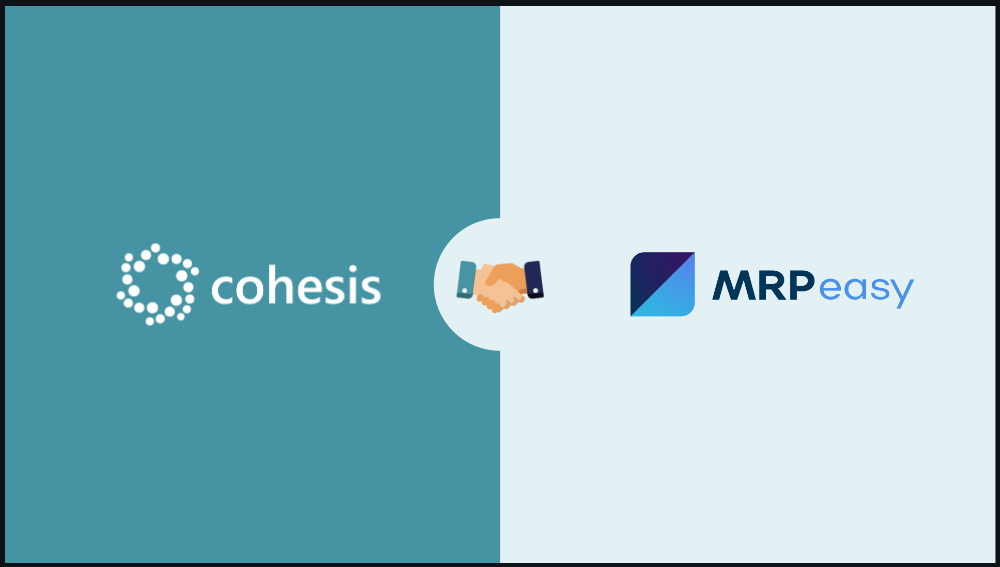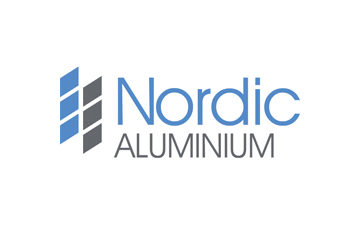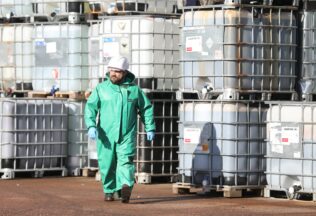IT Consultant: Data Is Essential for Production Planning and Profitability
Simon Cohen, Founder of Australian IT consultancy Cohesis, has made it his mission to help manufacturers ditch unsustainable systems for those that support growth, not impede it. “Without accurate data, they can’t plan production or ensure profitability,” he says.

Boutique consultancy serving the Asia-Pacific region and beyond
Cohesis is a boutique IT consultancy based in Perth, Australia. Founded in 2019 by seasoned software developer and IT project manager Simon Cohen, the company primarily helps small and mid-sized manufacturers modernize operations, but also consults professional services agencies and local government institutions. From its Australian base, Cohesis serves clients across the Asia-Pacific region and beyond.
“We’re in a sweet spot for Singapore and Manila, and our team is internationally based, so we also work with organizations in New Zealand, the Middle East, and Eastern Asia,” Cohen explains.
While the IT consultancy was founded in 2019, Cohen’s IT journey started already as a child, when he learned to code by himself on 8-bit Spectrum 48k and 128k computers – the UK’s alternatives to the hugely popular Commodore machines.
“I was one of those geeky kids who wanted to explore how to code,” he says. “But my school didn’t have a technology pathway, so after high school, I ended up getting an economics degree.”
A developer turned manager turned entrepreneur
Simon’s interest in tech and programming did not wane, however. After the dotcom bubble burst in 2000, he decided to dedicate himself to software and started developing solutions for inventory management, purchasing, and other business functions. Soon, he realized that being a programmer in the back office would not satisfy him.
“Developers rarely make it to management positions, but that’s where I wanted to be,” he explains. “So, I went and did my project management badge, program management badge, and my IT service delivery badge.”
Thanks to this relentless self-development, Simon ended up working for huge organizations like PWC, Thomson Reuters, and UBS, in addition to smaller organizations such as digital marketing agencies and as a General Manager for a Manchester-based tech startup. When he and his wife decided to move to Australia, he joined an Australian accounting firm as Head of IT Consulting.
“I did a year there and then decided to set up my own company – Cohesis,” Cohen says.
First project became a turning point
One of Cohesis’s earliest projects became a turning point. A manufacturer hired the firm to help select new software, leading Cohen to run a structured comparison of half a dozen systems.
“We looked at five or six different options, compared them side by side, and MRPeasy came out on top,” Cohen recalls. That first engagement marked the start of the company’s journey into manufacturing consulting.
Cohen was able to draw on his past experience developing warehouse management software and visiting manufacturing plants in the UK and Germany – including sites for Dimplex heaters and Fisherman’s Friend lozenges – where he had gained firsthand knowledge of production processes and system needs.
“I’d spent time on factory floors, seeing how products were made, packaged, and shipped. That gave me a real appreciation of manufacturing processes and how software fits in,” he explains.
What began as a one-off selection exercise soon evolved into a partnership with MRPeasy and the foundation of a dedicated implementation team. “In a way, we kind of fell into it – it wasn’t by plan or design. A customer needed those skills, I had the background to help, and we built a team around it. That’s how Cohesis became an MRPeasy partner,” Cohen says.
Manufacturers struggle with unsustainable systems
Cohesis typically engages with manufacturers when existing processes and systems have become unsustainable.
“Planning their manufacturing just becomes too hard. They don’t know where their stock is, they don’t know their costs, and without accurate data, they can’t plan production or ensure profitability,” Cohen explains.
Many of these companies still rely on spreadsheets or outdated legacy tools – systems that, as Cohen puts it, “end up costing them more money than what they thought they were saving.”
To address this, Cohesis has developed a structured but flexible implementation approach. For clients already committed to MRPeasy, Cohesis offers three levels of service: done by you (with coaching), done with you (a collaborative model), and done by us (a full-service implementation). For those still evaluating, Cohesis runs tailored software selection or validation projects to confirm the right fit.
Success is when client feels confident using the new system
All projects follow a proven Discover → Transform → Embed methodology. The discovery stage involves mapping processes and preparing data; transformation covers configuration, data migration, integrations, and tailored training; and embedding focuses on testing, go-live, and hypercare. “Success for us is when a client feels confident using MRPeasy on their own and it becomes embedded in their culture,” Cohen notes.
While MRPeasy is Cohesis’s most common recommendation, the firm works independently and has experience integrating CRM, finance, and other tools into a connected application ecosystem. “One tool is never a perfect utopia,” Cohen says. “Our role is to help manufacturers join the dots between the systems they already have and the ones they need.”
Projects are not without challenges
While Cohesis has a proven implementation process, projects are not without challenges. “Mainly it’s how busy clients are – sometimes it’s difficult getting the necessary data, and getting the client to put in the time,” says Cohen. Unexpected delays often arise when key people go on leave, get pulled into urgent business, or even leave the company. These gaps slow down discovery and configuration work, which depend on accurate data and active client involvement.
Cohen recalls one project where everything was configured, tested, and staff trained, only for the client to repeatedly postpone go-live. “We were meant to go live in March, then it slipped to April, then June, then July. At that point, we had to charge a fee – it was just ridiculous,” he says. In another case, last-minute requirements surfaced after the project scope had been agreed upon, forcing the team to backtrack and reassess.
When these challenges arise, Cohesis manages them with clear communication, governance, and stakeholder engagement. “Life happens and you just have to manage it as best you can,” Cohen explains.
A partnership built on trust and responsiveness
Cohen emphasizes that the partnership with MRPeasy is built on trust and responsiveness. “I’d like to think that Cohesis is a very safe pair of hands – we don’t let MRPeasy down, and we don’t let the clients down,” he says. The company not only delivers implementations but also extends the ecosystem with its own custom integrations.
“We’re building technology that extends the capability of MRPeasy in ways we know manufacturers want. It lets us leverage our existing tools and align them with MRPeasy,” Cohen explains.
When it comes to project completion, Cohesis provides around 10 days of aftercare as the software is deployed, addressing issues and fine-tuning processes. After that, additional support is optional.
“Most clients don’t feel they need it and for me, that’s a good thing. It means they’re confident with the system,” Cohen notes.
A typical project takes 3-4 months
Since 2019, Cohesis has completed around 20 MRPeasy implementations. “Some clients have had multiple implementations across different territories, so it adds up,” Cohen maintains. “And typically, an implementation takes somewhere between three to four months from start to finish, so they’re fairly big pieces of work.”
In terms of project cost, Cohesis works across a wide range. “It completely varies,” says Cohen. “If the client just does it with us validating their approach, it can be 5,000-6,000 Australian dollars. If it’s a full-scale project – integrating with CRM, finance, maybe e-commerce, data migration, data cleansing – it could be up to A$35,000. An implementation isn’t just an MRPeasy implementation; it’s about how MRPeasy fits into the client’s whole application ecosystem.”
Still, most projects fall within a predictable bracket. “Most of our implementations are sub-20K,” Cohen explains. “Typically, they’re around 15 to 20K Aussie dollars – that’s about average complexity and size.”
Data is key to running a successful manufacturing operation
When asked which MRPeasy features stand out the most, Cohen doesn’t hesitate. “One of the things that really stands out is the reporting. There’s a whole load of reports in there, and that’s what clients want – data. We’re currently working with one client with a 60-day data shadow – they only get information 60 days after the event in terms of their financials. I mean, that’s crazy. How do you run a business like that? We try to solve that problem by giving them real-time data and great reporting, and that’s where MRPeasy delivers.”
Cohen also points to the balance of functionality across the system. “It does inventory management well, but it also does the actual manufacturing part of the process, including the production schedule. For people used to spreadsheets, it can feel like a lot of information. But with a bit of training, they get it. And then they see how it really maps out the production process. That’s important because you need to see the reality of what you can actually do. And MRPeasy does that really well.”
Not all systems are built equal
But it’s not just about having features – it’s about how they’re built. “Many other pieces of software have similar features, but how well those features are crafted and how robust they are make the difference,” Cohen explains.
Finally, he highlights the API. “Not all APIs are built the same, but MRPeasy’s is robust. We often extend little things from MRPeasy for clients, and the API makes that possible.”
Cohesis’s work across multiple industries also keeps the team exposed to various developments. “We do a lot of work in local government here, and I do a lot with Microsoft 365, so we stay informed on those areas. We’re sensitive to what’s happening in supply chains, we try to stay ahead of technology trends, and we’re members of some industry groups. But honestly, one of the best sources of information is our clients. By really talking to them, we get a direct view of what’s going on in their industries.”
You may also like: 900% Price Hike Prompts Medical Device Manufacturer to Switch ERPs




